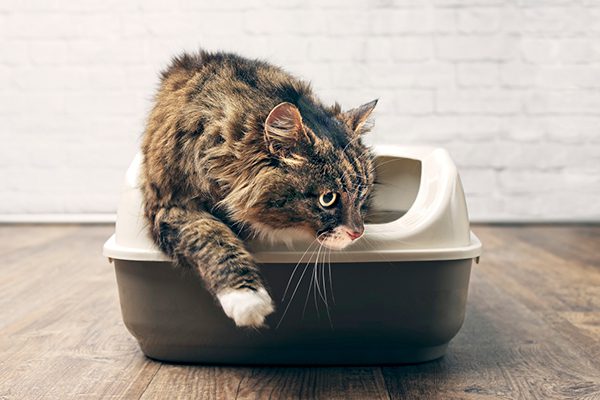My Cat Won’t Poop: Causes and Treatments for Cat Constipation

Cat constipation is a common and treatable problem among the feline community. Constipation means that your cat is not productively digesting their food, and they are having trouble having a successful bowel movement.
Poor nutrition and obesity can render your cat constipated. Fortunately, you can alleviate the problem with a special diet and foods high in fiber, like pumpkin, which can help your cat produce healthy stool.
Most cats have the occasional bout with constipation, and it can be easily managed with some small but critical changes in your cat’s diet and exercise routine. Before the problem becomes severe, take them to the vet. Read below to learn the causes and treatments for cat constipation.
What Are the Causes of Constipation in Cats?
Certain factors can contribute to cat constipation. Disease and nutrition play a crucial role in your cat’s ability to produce stool. Older cats are more prone to constipation, especially if they have certain illnesses. The following are all reasons why your cat could be constipated:
Kidney Disease
Kidney disease draws water from the body, making your cat dehydrated, and stool is difficult to pass. Your cat’s body tries to conserve water by reabsorbing it from the stool through the intestinal wall.
The intestine takes every drop of water that it can, which renders your cat constipated. The stool is very hard and dry.
Obesity
Obesity plays a role in constipation in cats. Studies have indicated that older, overweight cats with chronic kidney disease or a history of constipation were more likely to be constipated.
If your cat is not getting enough physical activity, they can put on extra pounds, which may cause constipation.
Poor Nutrition
It is best to feed your feline wet foods that encourage healthy bowel movement due to the moisture and nutrients it provides. You should also make sure they are getting enough fiber in their diet.
According to research, canned pumpkin is 90 percent water and 2.8 percent fiber. Pumpkin is an excellent choice to try to relieve your cat’s constipation.
Megacolon
In this condition, the colon becomes larger and more distended than it should be. Megacolon slows down the production of stool and causes constipation. The feces become hard and large in cats, which is quite uncomfortable for them.
The smooth muscle in the colon that pushes stool out of the body does not function well anymore, becoming very weak. It is a severe condition and requires your veterinarian’s assistance.
Matted Hair
Matted hair around the anus can trigger constipation because it can prevent the exit of the stool. This hair is the first scenario you should consider when you suspect your cat is constipated. You might be able to remove the mat yourself.
If not, your veterinarian or even a professional cat groomer can help. Keep your cat well brushed to help prevent this.
Obstructions
Obstructions in the gastrointestinal tract can block your cat from successfully passing stool. The problem could be caused by your cat ingesting a foreign body or swallowing excess hair while grooming.
They could have also consumed something that is not digestible, such as a small toy or other items. If this is the reason, you should make contact with your vet right away.
Symptoms of Cat Constipation
There are a plethora of symptoms of constipation in cats. Cats may have similar symptoms (see video) for urinary disorders, and it is essential to find the appropriate diagnosis. Further down are some of the general symptoms of constipation:
- Constantly going to the litter pan but having little or no success
- Crying or straining while in the litterbox
- Loss of appetite
- Vomiting
- Lethargy
- Demonstrating abdominal discomfort
- Small, dry, or hard stools covered in blood or mucous
Cats should have at least one healthy bowel movement each day. If your cat is suffering from any of the above symptoms, you should contact your veterinarian.
What is the Remedy for Constipation in Cats?
Fortunately, most of the time, cat constipation can be treated at home with specific remedies. Constipation can be managed easily as long as it does not become chronic or frequent. The following are all treatments for constipation:
Food
When it comes to food for constipated cats, one ingredient you need to avoid is grains. Most cat food is formulated for gastrointestinal health because it is not easy for them to break down. It can take too much time for grains to digest, and it can turn into more fat than is necessary. Feeding your cat grains at every meal can result in serious health issues.
You may want to pay attention to keywords like prebiotics in your cat food’s formula. Prebiotics can help improve gut health so that your cat can digest foods more effectively. Prebiotics supports the development of good bacteria in your cat’s gastrointestinal system, which can enhance both nutrient absorption and immunity.
There are foods that are specifically formulated to prompt your cat to have healthy daily bowel movements. It would be the best idea to talk to your vet before starting any special diet for your cat.
Regular Exercise
If your cat leads a sedentary life, this can contribute to constipation. Obesity can make your cat lethargic. Incorporate some daily exercise into their routine. It will improve the function of their intestines. Make playtime interesting for them. There are so many toys on the market to choose from.
Increased Water Intake
Water helps help to lubricate their bowels and get things going. You can increase your cat’s water consumption by feeding them more wet food. Cats get most of their water consumption from their food.
Place water bowls all over the house to encourage them to drink more. You can also add low sodium chicken broth to their food to spice things up for them.
Laxatives
Talk to your vet regarding giving your cat a safe and effective laxative if you have tried the natural route and it did not work. You may consider adding one teaspoon of Metamucil per day to your cat’s wet food. Make sure your feline has enough water available when using this laxative.
Surgery
If your cat has lost permanent loss of function of the affected colon, surgery may be the only way to correct the problem. Therefore, it is essential to take care of cat constipation when you first see the symptoms.
Surgery involves the removal of the affected portions of the colon. Cats have a positive outcome from having this procedure. It would be best if you chatted about this option with your vet.
If Your Cat Won’t Poop, Talk to Your Vet
While there are many causes of cat constipation, there are also many different solutions. You can add more fiber and water to their diet, or if these simple solutions do not work, you can try a safe laxative under your veterinarian’s supervision.
In severe cases, surgery may be the only option. Whatever the case, you should make sure your fur baby has the best treatment possible.
At Companion Animal Hospital of Oak Park, we’re here for all your veterinary needs. If you ever have any questions about your cat’s health, don’t hesitate to give us a call!
